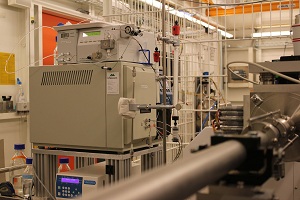Researchers at the European Molecular Biology Laboratory (EMBL) in Hamburg, Germany, have incorporated a multi-detector array size exclusion chromatography (SEC) system from Malvern Panalytical (Viscotek TDA –Triple Detector Array) at the laboratory’s powerful small angle X-ray scattering (SAXS) beamline to improve the productivity and quality of detailed protein characterization work.

Use of the Viscotek TDA triple detector array system prior to analysis provides complementary biophysical data and simultaneously purifies samples for measurement. This results in more information and better quality data from each experiment. This innovative set-up is not only limited to the institute itself, but is widely accessible to structural biology researchers via BioStructX, a European Commission initiative that creates a single gateway to Europe’s leading synchrotron facilities.
SEC produces a fractionated sample for measurement, separated on the basis of hydrodynamic size. The Viscotek TDA incorporates refractive index, UV and light scattering detectors which in combination provide concentration and absolute molecular weight measurement for these eluting fractions. Integrating this system with the SAXS beamline provides it with purified samples for measurement that give enhanced signal-to-noise ratios and high quality data. In combination with the biophysical information from the TDA these data provide detailed information about the internal shape and structure of proteins that advances understanding of their behaviour. In particular SAXS data is valued for the determination and monitoring of the low resolution structures and conformational changes that proteins exhibit.
Both Malvern Panalytical and EMBL Hamburg are partners in the BioStructX project which brings together facilities from across Europe to establish a state-of-the-art coordinated and multi-site infrastructure to support access for key methods in structural biology. The new integrated SEC-SAXS set-up was developed by a number of experts within EMBL, and with input from Malvern Panalytical to enhance the department’s offering to BioSAXS users transnationally. The automated multi-pronged characterization it offers has already demonstrated its significant advantages to the first users and is expected to be in considerable demand as the BioSructX project advances.